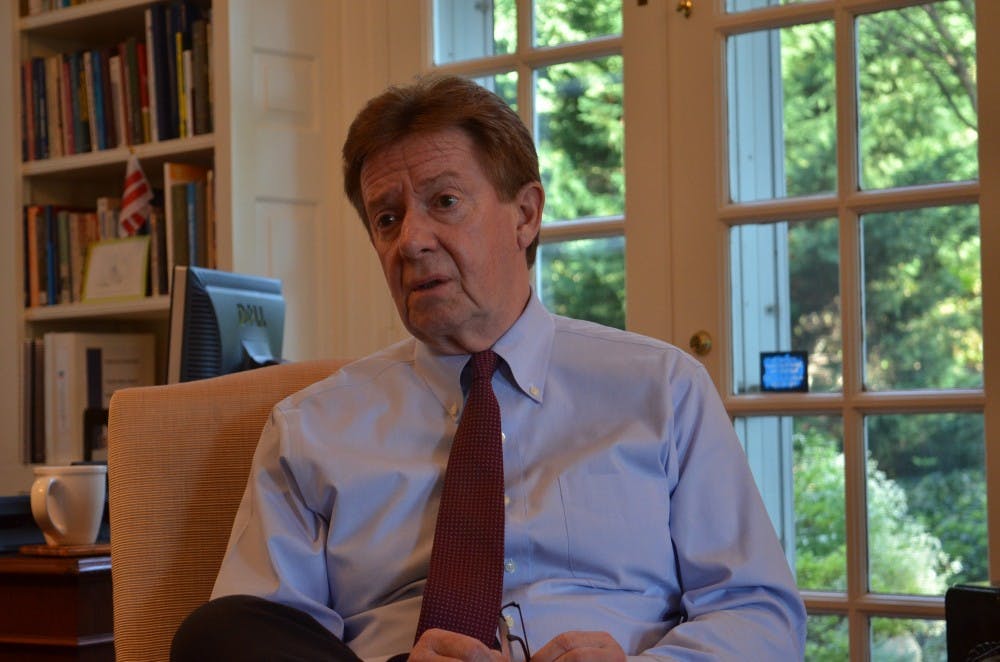University President Neil Kerwin said he wants to reassure the community of administrators’ commitment to ensuring all students feel safe and included, a week after news of racist attacks against black female students on campus first surfaced.
Kerwin sat down with The Eagle on Friday to discuss what the administration is doing to address student concerns, and how he as the leader of the university is leading those actions.
“As the president of the institution I was myself shaken by it, but you can only afford yourself so much time with that, then you have to decide and make sure that the entire institution is focusing on making this better,” Kerwin said.
The days following the two reported incidents in Anderson Hall have been filled with outcries from students demanding University action, including that the administration utilize open communication to inform students of its specific plan of action to prevent further such incidents.
So far, Kerwin has communicated directly with the student body through a memorandum sent via email to the campus community on Sept. 19. The University also released a statement online on Sept. 16 condemning the attacks after rumors of the attacks started circulating on Sept. 15.
Kerwin said that such communication is meant to show students that administrators are aware of how damaging news of the attacks were, and that he understands the concerns students have about how seriously the administration takes issues of racism.
“But you know we’re going to have to work very, very hard this year and in the years to come, to convince students that when incidents of this sort occur that we’re going to act on them, and we’re going to act on them seriously,” Kerwin said.
Students themselves have taken serious action in response to the attacks, including a rally on Sept. 19 in which hundreds of people gathered to protest racism on campus and to demand immediate action from the university. There have also been two town halls in response to the attacks.
Kerwin said that he did not attend the rally, and could not attend the town hall due to a “long standing commitment off-campus,” but that he has been in close communication with the administrators who were there. Moving forward, he said he plans to be at any student events where he feels his presence can make a difference.
In light of the attacks, AU’s Black Student Alliance released a statement demanding specific action from the University, including a private meeting with Vice President of Campus Life Gail Hanson, which took place on Friday.
Kerwin said that while he has met with several student leaders since the attacks, including Student Government President Devontae Torriente, he has yet to meet with any members of the Black Student Alliance.
“I try to make sure my door is always open to students who wish to talk with us, and if my engagement with students of color, again, through a series of conversations is deemed to be essential, that’s what I’ll do,” he said.
Kerwin said that one of the most vital portions of the University’s strategy moving forward is his campus diversity and inclusion plan that was announced in February. The plan includes five actions to help foster a more welcoming campus environment, including the creation of a council within the president’s cabinet to oversee the implementation of the plan, a new, mandatory diversity and inclusion training for all first year and transfer students, a revision of the University’s current discrimination policies, and to hire five new faculty of diverse backgrounds and implement diversity and inclusion training for new faculty.
While these five tenets serve as the backbone of the strategy, Kerwin said that the plan is a “living document” and that the council, led by Department of Performing Arts Professor Caleen Jennings, intends to update and build on it as needed, especially given the current campus climate.
“But the council was expected also to be providing, over time, for changes to the plan itself,” he said. “And frankly now my expectation is that will happen more quickly than it might have happened otherwise. In other words, you anticipate a deliberative process, but events overtake you, and you may have to move more quickly on some element that wasn’t anticipated specifically in the plan.”
Two of these elements that Kerwin said may be looked at again soon include a “greater emphasis on policy and practice” and a harder push for training and discussions with faculty and students. However, he did not specify what kinds of policy changes could occur.
At the cornerstone of the plan’s purpose is to ensure that all students feel safe and included on campus, something which Kerwin admits the University needs to continue to work to do.
“Can I sit here and tell you with confidence that in a couple of years we’re going to be able to eliminate the problem? I can’t,” he said. “But I can tell you that for as long as I’m in this job, and as I mentioned in the memo that I sent when I announced my stepping down, was that this was an issue I expected to work on throughout the last year of my presidency, and I will.”
Beyond his own role in addressing these issues, Kerwin said that it will take everyone in the community, students, faculty and administrators to change the campus climate. He said he wants to see people engaging in “unavoidable conversations” about how they can play a role in helping the community to do better.
“I think it’s a collective effort for the entire community. This is one where everybody has to be at the table,” Kerwin said. “I think that trying to solve these things in silos isn’t going to get the job done. We can’t allow students to take full responsibility for something that they didn’t create, for an environment they feel needs to improve across the entire institution.”





